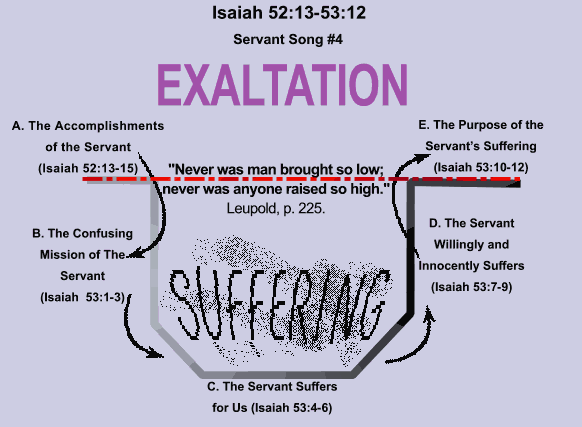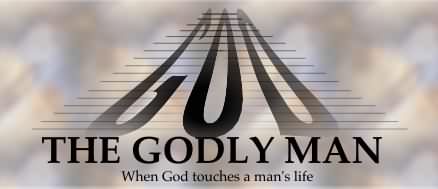
The Godly Man:
When God Touches a Man's Life
Paul J. Bucknell
 Isaiah 53, The Messiah
Isaiah 53, The Messiah
The Secret of Humility
The inspirational example of Jesus the Messiah from Isaiah 53 challenges each one of us to humbly pick up the cross and follow Him.
We only need to meditate a bit on this five stanza prophecy to better understand what Jesus was modeling for us. He descended from on high to suffer for us so that we, with Him, could reign on high. If the perfect would humble himself for the imperfect, how much more should we humble ourselves and serve others.

A. The Accomplishments of the Servant
(Isaiah 52:13-15)1. The glory of the Servant (13)
2. The suffering of the Servant (14)
3. The redemption of the Servant (15) (I Pe 1:1-2)
13) Behold, my Servant will act wisely;
He will rise up, be lifted up, he will be exalted on high.
14) Just as many were astonished at you,
so his appearance was disfigured so to lose resemblance with man, so his form was marred beyond recognition as a man.
15) Just so he will sprinkle many nations;
and kings will shut their mouths because of him; for that which they were not told, they will see; and that which they have not heard, they will understand. (Isaiah 52:13-15)Three poignant synonyms are used in this verse, "He will be raised and lifted and highly exalted" (NIV).
From the reader's vantage point, the strong emphasis is unclear until we see in the following verses how far Yahweh's Servant first had to descend.
Whether an accumulation of synonyms or successive stages of exaltation (commencement, continuation and climax of exaltation), 'the passage certainly predicts the post–resurrection exaltation of Christ (Ac 2:33; 5:31; Ph 2:9) and, retrospectively, appropriately allows for the three stages in that exaltation."
Interestingly, the Septuagint and the Old Latin translations use two verbs instead of three.
B. The Confusing Mission
of The
Servant
(Isaiah 53:1-3)1. Reflection of the Servant's Work (1-2)
a. Difficulty of believing (1)
b. Surprising nature of the Servant (2)
2. A Reflection of the Servant's Person (3)
Who has believed our message? And to whom has the arm of the LORD been revealed? For He grew up before Him like a tender shoot, And like a root out of parched ground; He has no stately form or majesty That we should look upon Him, Nor appearance that we should be attracted to Him. He was despised and forsaken of men, A man of sorrows, and acquainted with grief; And like one from whom men hide their face, He was despised, and we did not esteem Him.
(Isaiah 53:1-3)"... Leaders in distant nations, who expected that the answer to the problem of life might be given by a powerful Roman leader or by a great Athenian philosopher.
To them, a Galilean peasant, living and dying in a little country on the very fringe of a great civilization, seemed like a frail plant, growing in a parched ground, altogether lacking the majesty and beauty that they would have expected to find."
The Gospel of Isaiah, p. 135.C. The Servant Suffers for Us
(Isaiah 53:4-6)1. Our sin, Our misunderstanding (4)
2. His sufferings, Our transgressions (5-6)
Surely our griefs He Himself bore, And our sorrows He carried; Yet we ourselves esteemed Him stricken, Smitten of God, and afflicted. But He was pierced through for our transgressions, He was crushed for our iniquities; The chastening for our well-being fell upon Him, And by His scourging we are healed.
All of us like sheep have gone astray, Each of us has turned to his own way; But the LORD has caused the iniquity of us all To fall on Him. (Isaiah 53:4-6).
a) Reasons for His suffering (5a)
b) Results of His suffering (5b)
c) Reasons for our troubles (6): Jesus suffered so terribly on the cross. He healed people and it seemed as if God as displeased with Him. But, in fact, Jesus died because of our sins.
D. The Servant Willingly and
Innocently Suffers
(Isaiah 53:7-9)1.Willingly suffered (7) Mt 26:63; 27:12-14
2. Suffered judgment of death (8)
3. Innocently died (9)
He was oppressed and He was afflicted, Yet He did not open His mouth; Like a lamb that is led to slaughter, And like a sheep that is silent before its shearers, So He did not open His mouth. By oppression and judgment He was taken away;
And as for His generation, who considered That He was cut off out of the land of the living, For the transgression of my people to whom the stroke was due? His grave was assigned with wicked men, Yet He was with a rich man in His death, Because He had done no violence, Nor was there any deceit in His mouth.
(Isaiah 53:7-9)."His grave assigned with wicked men." If he died with them, one would expect him to be buried with them. But he wasn't!
When God asks you to go through hard times, do you complain or can you, like Jesus, trust God to care for you and the situation? Write down a few thoughts.E. The Purpose of the Servant's
Suffering
(Isaiah 53:10-12)
1. God's gracious will (10)
2. An effective sacrifice (11)
3. Blessings from His death (12)
But the LORD was pleased To crush Him, putting Him to grief; If He would render Himself as a guilt offering, He will see His offspring, He will prolong His days, And the good pleasure of the LORD will prosper in His hand. As a result of the anguish of His soul, He will see it and be satisfied;
By His knowledge the Righteous One, My Servant, will justify the many, As He will bear their iniquities. Therefore, I will allot Him a portion with the great, And He will divide the booty with the strong; Because He poured out Himself to death, And was numbered with the transgressors; Yet He Himself bore the sin of many, And interceded for the transgressors. (Isaiah 53:10-12).
Jesus is portrayed as a willing servant who died for others because someone else wished Him do so.
Quietly and humbly, He went to the cross for the sins of many. His death justified these people, giving these wayward ones the right to become the children of God. Let's give thanks for God's grace!!!
Jesus is portrayed as a willing servant who died for
others because someone else wished Him to do so.
Quietly and humbly He went to the cross for the sin of many. His death justified these many people, giving these wayward ones the right to become the children of God. Let's give thanks for God's grace!!!
Next =>Humility and Suffering
Check out the Old Testament Digital Library for much more discussion on this topic (50+ pages)!
info@foundationsforfreedom.net
Scriptures typically quoted from the New American Standard Bible unless noted:
(C) Copyright The Lockman Foundation 1988











